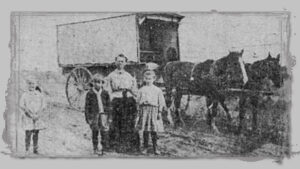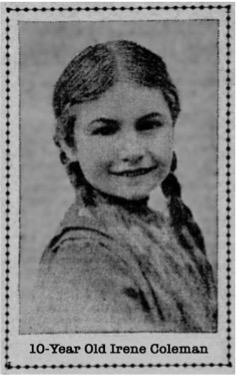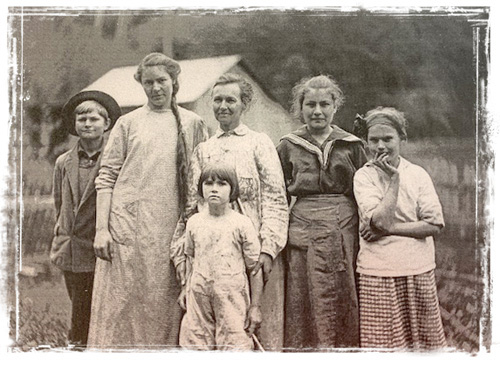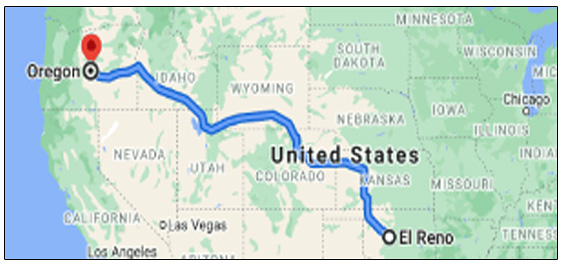MATTIE COLEMAN
Siuslaw Pioneer Woman
A discarded newspaper describing homestead land in Oregon was enough to lure her to embark on a 2,000 mile journey from El Reno, Oklahoma. Mattie’s husband had deserted her and their family of 5 children . . . . . Their only possessions were a team of work horses, a wagon, shotgun, bedding and a few cooking utensils. With $10, they set out for Oregon in April, of 1911.
 This is a story of the hardship, courage, and determination of Mattie Coleman, a remarkable pioneer woman and her family. For 37 year-old Mattie Coleman, a discarded newspaper describing homestead land in Oregon was enough to lure her to embark on a 2,000 mile journey from El Reno, Oklahoma. Mattie’s husband had deserted her and their family of 5 children. The oldest child was 12 and the youngest still an infant. Their only possessions were a team of work horses, a wagon, shotgun, bedding and a few cooking utensils. With $10, they set out for Oregon in April of 1911. Resourceful, determined, and with a true pioneer spirit ‘running through her veins’, Mattie and her children camped where they could. Along the way, Mattie took on work helping farmers can fruit, clean houses, wash, and cook for families and working camps. Her fammily hunted for their meals – rabbits, quail, squirrels and doves. The journey was far from easy, and the difficulties and challenges numerous. It took 3 months to reach Laramie, Wyoming, where they remained for the winter. Mattie found work, and in the Spring, they continued the journey westward. Traveling through Idaho and the Cascade Range, their wagon overturned while crossing a river and were fortunate to have been saved by cowboys who carried the family to the riverbank. Despite their food supply diminishing, the last sack of flour was traded for feed for the wagon team. Two months later, they arrived in Oregon’s Willamette Valley. It is said by the end of the trip, 30 cents was all they had spent on meat for their sustenance, while most of their money was spent on other provisions. Shortly after their arrival, they stopped at Wise Villa, where Mattie found work as a cook in a railroad camp on the Siuslaw. It was there she learned of an abandoned homestead on upper Maple Creek in western Lane County.
This is a story of the hardship, courage, and determination of Mattie Coleman, a remarkable pioneer woman and her family. For 37 year-old Mattie Coleman, a discarded newspaper describing homestead land in Oregon was enough to lure her to embark on a 2,000 mile journey from El Reno, Oklahoma. Mattie’s husband had deserted her and their family of 5 children. The oldest child was 12 and the youngest still an infant. Their only possessions were a team of work horses, a wagon, shotgun, bedding and a few cooking utensils. With $10, they set out for Oregon in April of 1911. Resourceful, determined, and with a true pioneer spirit ‘running through her veins’, Mattie and her children camped where they could. Along the way, Mattie took on work helping farmers can fruit, clean houses, wash, and cook for families and working camps. Her fammily hunted for their meals – rabbits, quail, squirrels and doves. The journey was far from easy, and the difficulties and challenges numerous. It took 3 months to reach Laramie, Wyoming, where they remained for the winter. Mattie found work, and in the Spring, they continued the journey westward. Traveling through Idaho and the Cascade Range, their wagon overturned while crossing a river and were fortunate to have been saved by cowboys who carried the family to the riverbank. Despite their food supply diminishing, the last sack of flour was traded for feed for the wagon team. Two months later, they arrived in Oregon’s Willamette Valley. It is said by the end of the trip, 30 cents was all they had spent on meat for their sustenance, while most of their money was spent on other provisions. Shortly after their arrival, they stopped at Wise Villa, where Mattie found work as a cook in a railroad camp on the Siuslaw. It was there she learned of an abandoned homestead on upper Maple Creek in western Lane County.
The children were temporarily left with a family in Drain, Douglas County. Mattie borrowed a saddle, mounted one of her horses, and set out with her remaining 80 cents, determined to locate and lay claim to the homestead – if not that one, another one suitable for her family. On horseback she rode from Drain to Scottsburg, then journeyed by boat (on credit) to Gardiner and Florence in order to find the abandoned Maple Creek homestead. She learned that although occupied at one time, it was presently abandoned and located 12 miles from the Glenada post office, with 70 acres, 12 of which were in the valley, tillable, and had at one time been cultivated. A one-room cabin and lean to existed on the land. She applied for a claim to the homestead with a forest ranger.
Unsure whether she would be awarded the claim, she set out north that same day from Florence towards the Heceta Beach lighthouse area in search for other homestead land she heard was available. She spent the night with the lightkeeper’s wife. The next day she journeyed to Waldport, up the Alsea River, onto a forest trail to Toledo, then Corvallis, then back to Drain. In all, a 200-mile trip on horseback in the Winter, alone on unforgiving trails.
In the Spring, Mattie and her children moved into the abandoned homestead on upper Maple Creek.
With help from her children, they felled trees, built fences, planted a garden, and started an orchard. They struggled with the hard work, and in their second year, managed to purchase a cow. Luck was not with them however, for despite their best efforts, the cow died during a cold snap. The family raised grain the following year, and 5 acres were cut by Mattie and her daughter using a scythe. They then added chickens, which helped financially and the family hoped to begin saving to pay the required homestead claim fees.
Realizing their situation was desperate and that she needed to continue working to survive the winter, Mattie gave her 10 year-old daughter Irene, the family’s remaining 50 cents to enlist help. Irene Coleman set out for Eugene with the 50 cents and a letter to locate a minister and ask for help for the family. She managed to hitch a ride from stage coach drivers Billy (William Hamilton), Bert (Bert Barney), and Charlie (Charlie McCann), who refused to take her 50-cent piece for the trip and instead bought her dinner once they arrived in Eugene. A minister gave Irene $1 before sending her to Juvenile Court for assistance. At the Courthouse, Irene described the family’s struggle on the homestead and the desperate need for money to get through the winter. She told them of ther siblings Faith Fay, 13, Arthur Ray, 8, Muriel Marie, 6, and 2 year-old Kathyleen Roweena. A heartfelt newpaper article first published in Eugene led to other news articles that spread throughout the state telling of their hardship. Local resident Mrs. W.R. Lawson took Irene in for a time, while women’s committees established an “Irene Coleman fund” at Christmas, raising $200. In Eugene and Cottage Grove, funds were raised to purchase the family two cows, plows, a harrow, feed, chickens and a lamb.

In the Fall, Mattie worked picking hops at the Seavey Farm in Springfield to earn enough money to support the family through the coming winter. She returned to her homestead in late September and sadly, their horse died two weeks later.
On November 12, 1916 while Mattie was out milking cows, a fire started in the cabin and flames quickly spread upstairs to where her youngest daughter slept. Mattie braved the stairway, nearly suffocating in order to rescue the child. Mother and child were able to exit safely, but the house burned to the ground and all the contents were lost.
Women’s committees in Florence and Eugene raised money and contributed household goods and articles to replace those lost in the fire. With kind folks in Eugene and Florence contributing lumber, neighbors built the family another house.
On May 29, 1918 Mattie was granted the land claim.
One may view Mattie Coleman and her family’s lives as poor – or then again, it might be viewed as one rich in pioneer history. With the generous help from others throughout the years of hardship, their courageous journey was a fulfillment of a dream and hope for one woman and family. In the end, their new life in Oregon was well worth the struggle and hardship.


